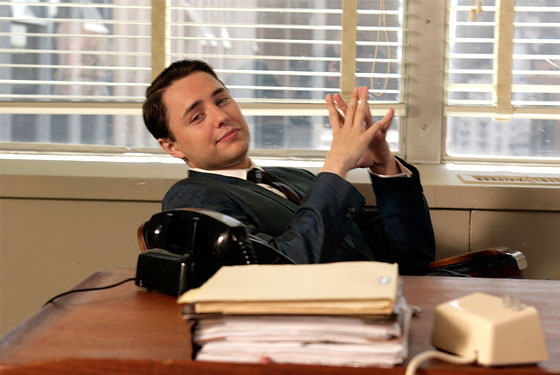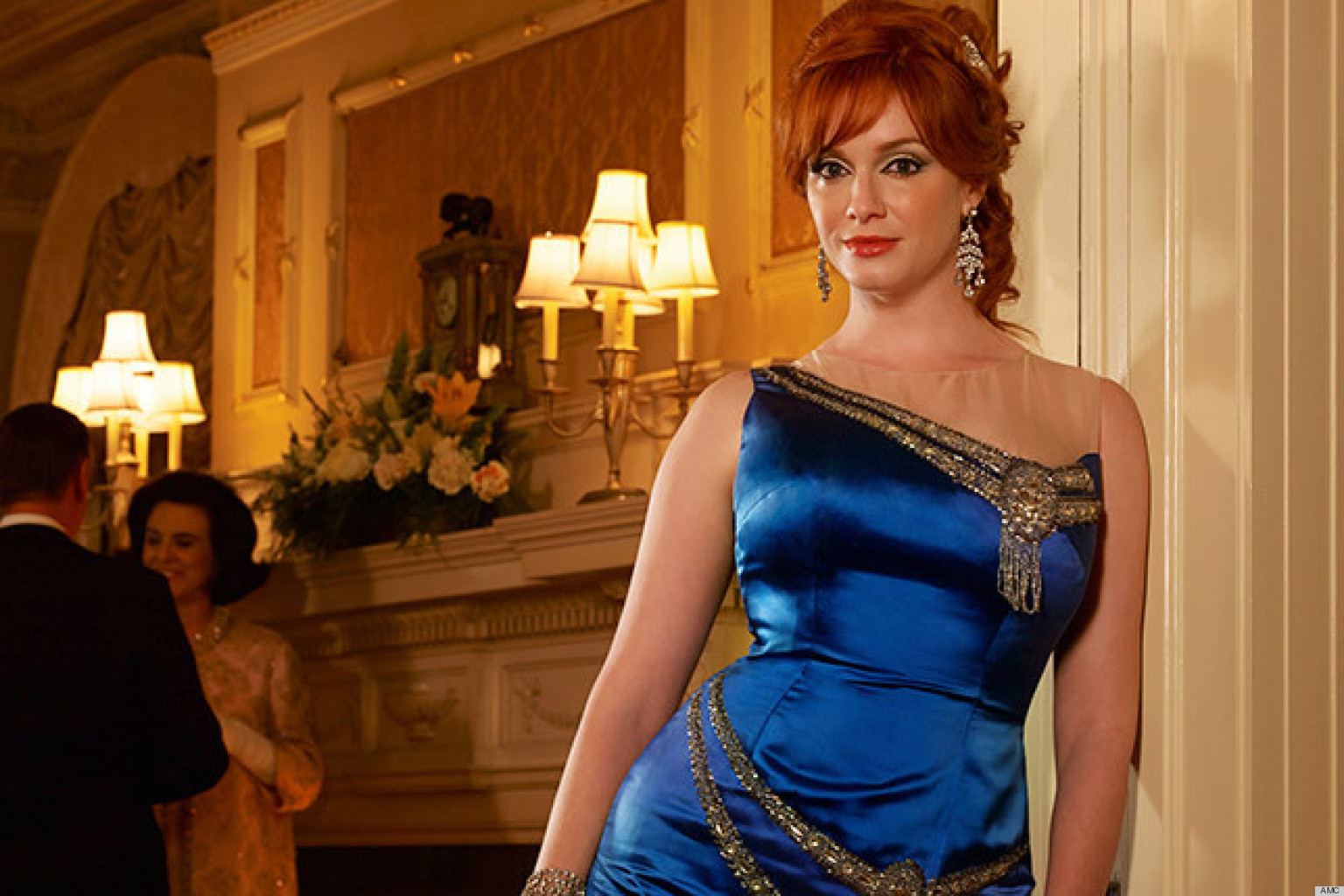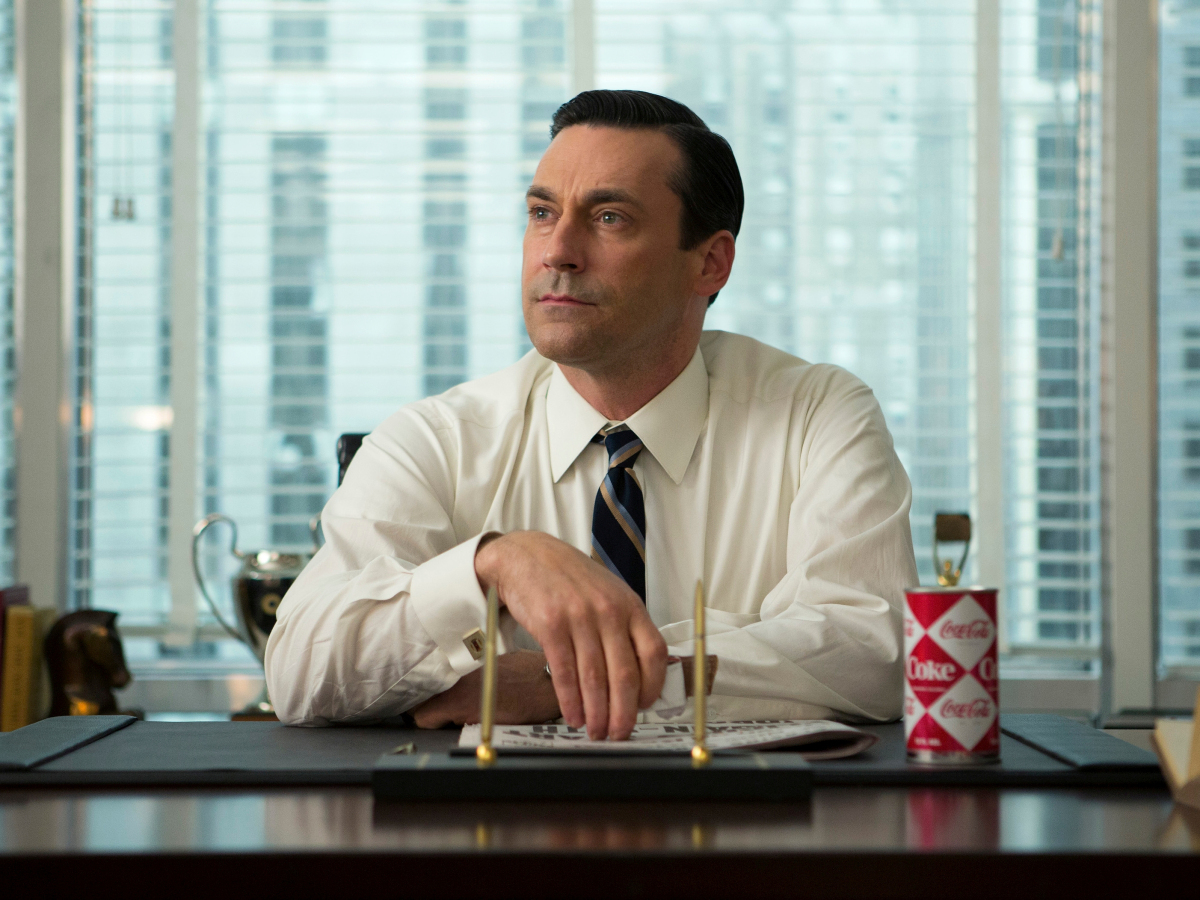Don Draper buys the world a coke. We end on one of the most iconic advertisements of the 1970’s, an ad campaign that literally brought Coca-Cola into the new age. It feels appropriate, blackly sardonic yet a completely empathetic portrayal of a man constantly fitting himself into different costumes and molds, whether in the black-and-white suit of an ad man or the Hawaiian shirt and loose trousers of a born-again hippie.
Throughout this half-season, Don Draper has been giving his material possessions away: to Megan, bequeathing five million dollars when he absolutely didn't need to, or to the young con man in "The Milk and Honey Route," offering his car before warning him “not to waste this.” He no longer has a home, a job or a family. Anna’s niece leaves him stranded at the end of the episode. In their last conversation, she’s wondering what exactly he thinks their relationship is, or has been, or could be, and who exactly he thinks he is -- that, all of a sudden, he can come in and nobly play the savior to her when it's clear that he’s just evading his own problems?
The mythology of Don Draper has been that of the savior. "Person to Person" – Mad Men’s brilliant finale, one of the greatest in television history, rivaled only by Six Feet Under in its ability to leave you both laughing and crying – wittles down the myth of Don Draper with a unique blend of biting comedy and authentic realism. The title of the finale is all-too-appropriate, and reflects Mad Men at its most self-contained and thematically rich. The characters find their endings through modest interaction – until the very last 10 minutes, it simply feels like another episode of Mad Men. Weiner steers clear of the melodrama, in favor of honest moments that reflect the gravity of personal history. And honesty means taking our characters for who they really are all the way until the end.
ROGER
Roger is superficial, yes, and he seems to embrace this part of himself, but his choice to go for someone older is also a reflection of a certain maturity. He might as well grow older with someone who is just as superficial as he is, right? Betty, maybe, might have been happier if she had chosen someone less morally upright than Mr. Francis. Roger is a clown, a goof, who maybe doesn’t take his life too seriously, but it is an admirable quality Joan respects in him. He’s the only man who ever regards her as an equal.
Cheers, Roger!
PETE
Pete Campbell is still a sleeze, his Trudy a fabulous yet unfortunately deluded Jackie O of yesteryear. He never loses his air of condescension towards his female colleagues, even in moments of encouragement, but his sexism has come a long way since Season 1, and you certainly see that in his last interaction with Peggy. His fate is entwined with hers, in the never-ending process of said and unsaid recognitions and disavowals the show is constantly teasing out until the end. He’s happy for her successes, and she for his.
Mad Men’s most iconic moments – say, an exuberant, newly hired Peggy dancing her way towards a cocky, self-satisfied Pete – are now ripe with regret and nostalgia. In the pilot, he sleeps with her, and subsequently wants nothing to do with her, not thinking much of her as a colleague. Peggy makes the hardest decision of her life, and gives up her baby to pursue her career. This decision haunts their history, yet, undoubtedly, his remarkable success by show’s end would have been impossible without Peggy, both because she carried the burden of their mistake and served as a source of creative competition. Pete wouldn’t ever admit to this, and Peggy would certainly accuse me of over-estimating their long-gone tryst, but –as viewers privy to all that went on – we saw how deeply their connection ran, and those weightier moments have come to inform even the most minor of farewells.
Will all this secret knowledge make Pete a better husband, or a man? I hope not.
PEGGY
Don is no longer around to emulate, and, for Peggy, this is a fact that is hardest to accept. Everyone’s pretty much accepted Don is gone, without batting an eye, really – except Peggy, who overestimates the emotional reaction everyone has had towards Don’s disappearance. In fact, it feels expected. Only she would want him back. It’s a constant attraction towards someone who she deeply admires. Yet Weiner doesn’t apologize for Peggy; he accepts her ambitions, her driven-persona. Don Draper created Peggy Olson, but – unlike Don – Peggy is fundamentally comfortable with herself.
That romance sweeps Peggy off her feet, in the most unexpected way, is simply a result of this new acquired comfort: she’s prickly, but that’s what Stan finds so attractive in her. Peggy likes this, and the match appears to be destined. In an absolutely brilliant sequence, they profess their love, like an infatuated Romeo and Juliet. Peggy resisted this cheesy stuff from the very beginning, but she’s able to shed her more serious side in one of Elizabeth Moss’s greatest moments of Mad Men. Peggy finally lets her guard down, and it pays off.
It, sadly, only took Don’s disappearance to bring this out in her.
BETTY
On the other hand, Betty doesn’t want to be comforted by anyone at all, having long ago given up on that idea of "romance." She’s the type of person who simply finds no solace in others. She can be cold, calculating and bitter, but finds comfort in knowing she’s going out the way she wants to, by giving in to her vices. Betty is always in a state of dissatisfaction, and her choice of sticking by her loyal cigarettes is tragic but expected. She’s very predictable, and you can’t help but loving that about Betty.
The only person she ever really connected to at all was Don, and we all know behind that connection there was always a perennial discontent. Maybe hearkening back to the end of Season 1’s "The Wheel," this episode’s phone-call between her and Don is imbued with the nostalgia of their respective pasts, with the remembrance of youth and their love. Their adventure ended tragically, yet the emotional pull of those final moments tells us there are some notions – no matter how false we know them to be – we end up falling for until the bitter end. Those notions might end as the only things that ever felt worth aspiring towards at all, and every affair Don has ever had – from Rachel Menken down to Diana – feels like wasted time in those precious last seconds they spend together. It can’t help but feel like a missed opportunity, their past, and it really breaks your heart.
[January Jones, I have had some complicated feelings about your acting skills, but – to quote the Wizard of Oz – I think “I’ll miss you most of all.”]
JOAN
The character who I've found to have grown most significantly is Joan, far beyond the reach of any other character: she loves work, and power, and her unique feminine mystique, and that hasn’t changed. She has the power, however, to do what no else does: create something that is truly hers. Where the characters all feel like cogs within the larger machines of companies or social structures, Joan pushes against the current of societal obligation and expectation. Joan Harris – dare I say it? – is a symbol for gayness, for marginalization, and she, as Betty puts it to Sally in a letter, “marches to the beat of her own drum.” Joan grows on you unlike any other character in Mad Men, and Weiner paints her as a trailblazer not simply for women in the workplace, but for self-professed and unabashed sexuality.
It’s no surprise Peggy wouldn’t go with her; it feels expected, their connection being tentative in some respect. Peggy desperately believes in the myth of Don Draper even until the end, and so does Pete, and Betty, and Roger: the only one who is ever able to see through Don’s bullshit is her. No other arc, aside from Betty’s, feels as perfectly measured, from the introduction to the last shot. Yes, she wants love, but she refuses to be caught in someone else’s orbit. She’s a good person, and I don’t know if I can say that of many other characters on Mad Men – she’s able to show compassion and love towards others, and regard herself with dignity.
DON
Don Draper – the sphinx, the cipher, the ever-elusive Mad Man of the 1960’s – appropriately has his life’s tragedy uttered by another man. Nobody ever really saw Don, none of these characters, no one could choose him (in the metaphor of the story), and he could never choose himself. He embraced an ideal, a man, a Mad Man that was never really a man at all. We fell for his charms, his pitches, his suave selling points (and Jon Hamm’s hypnotic talent for presentation): we could never love him, or know him, or see him. Every ensemble cast member of Mad Men internalized his presence, the grandeur of his myth: everyone broke out of it in a different way, including Don – I mean, sorry, Dick.
Dick Whitman – just like his predecessor Walt Whitman – encompasses many a life, a myth, a story, without ever fully letting us into who he really was, (who knew Dick loved, and was so knowledgeable about, cars!) and so it feels appropriate that he becomes by the end, not a man, but a darkly comic symbol for folly, for commerce, for history. Don is the fate of America, and you definitely don’t know by the end whether this is a good thing or a bad thing.
One question certainly ran through my mind, as that old Coca Cola commercial played: what the hell did we get ourselves into?
Grade: A+






